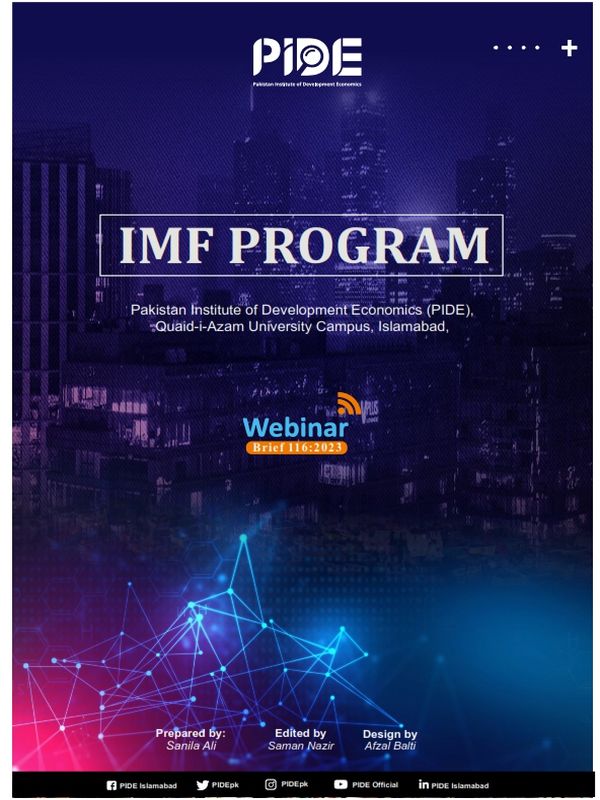
Pakistan Institute of Development Economics
- Home
Our Portals
MenuMenuMenuMenuMenuMenuMenu - ResearchMenuMenuMenuMenuMenuMenuMenu
- Discourse
- The PDR
- Our Researchers
- Academics
- Degree Verification
- Thesis Portal
- Our Portals
IMF Program
Key Discussion Points
The webinar started with welcome notes following the panelists’ introduction.
Pakistan is depended on external aid for decades, especially the International Monetary Fund. IMF has repeatedly demanded that Pakistan mitigate revenue shortfalls, debt servicing, and government expenditure.
Dr. Syed Ahmed Waqar, while commenting on the IMF 7 and 8 reviews, said that Pakistan’s long-term growth, productivity, and investment are declining, as rightly pointed out by IMF in its reviews. In this regard, the Pakistan Institute of Development Economics suggested that the IMF should focus on growth-centered strategies to bring out Pakistan from this crisis, which must be over 8 percent over the coming year. According to Dr. Waqar, a tight monetary policy for a long period may not be feasible for Pakistan to contain inflation and bring down the interest rate, as IMF suggests in its review. The supply side shock, an international phenomenon, currently contributes almost 80 percent towards high inflation and interest rate. Agreeably the economic crisis is not only specific to Pakistan, and it is a worldwide issue created by the Covid pandemic and now the Russia and Ukraine war.
Further, it was pointed out by Dr. Waqar that the Development of Financial Institutions, instead of positively contributing to the economy, is damaging it. The reason is that there are considerable gaps in policymaking and implementation, the policies are unrealistic, and they are not being implemented.
To solve the issue, some of the suggestions provided by PIDE are rationalizing tax withholding, increasing general sale tax, treating income tax as universal income tax instead of compartmentalizing it, get rid of the distinction between filer and non-filer, as it will harmonize the system and make it easy to implement, he also added.
Dr. Khaqan Hassan Najeeb, while commenting on the suggestion, agreed with most of the points. However, according to Dr. Hassan, income tax should not be treated as universal as it will put a burden on the lower income people. Dr. Hassan rightly points out that creating a single slab for all incomes unduly benefits few people at the cost of others, which further discourages tax filers. Further, it is suggested by PIDE that government should control public spending by closing down on loss-making public programs and reforming pension schemes which are a huge burden on the economy. To do this, the institutions in control must be made autonomous along with accountability. Instead of making a minister the head of these institutions, boards should be empowered. Moreover, there is overregulation in the economy, like in PPRA, which consumes a lot of consumers’ time. Lastly, instead of artificially maintaining the exchange rate, it should be left to the market, which can lower the current account deficit by 40 percent, which IMF also suggests.
While commenting on the role of the IMF in Pakistan’s economy Dr. Khaqan Hassan Najeeb said that IMF is partly responsible for the economic issue. IMF, instead of fixing the structural issue in the economy, is only giving steroids and keeping the economy alive.
Dr. Nadeem Ul Haq seconded Dr. Hassan and reiterated that IMF should point out the macroeconomic issues and provide technical assistance. There is a huge structural issue in the economy that cannot be solved by only providing aid. As far as the government is concerned, it needs to create an IMF plus, which must focus on the structural issues and try to solve them. Only completing IMF programs is not sufficient for prosperity. In the end, it is the government that needs to run the country. Relying on IMF funds while only giving breathing space and saving us from being like Sri Lanka is not a permanent solution.
Dr. Khurram Hussain, while commenting on the 2019 IMF program, said that, although IMF tried to solve some structural issues in that program, they were minor and not sufficient to solve the macroeconomic issue. Reform like the ease of registering a company is not going to solve the issue of fiscal deficit, which needs reforms at a major level. In that program, IMF did try to make the State Bank of Pakistan an independent body, but it remained limited to being on paper.
Overall, the webinar presented a holistic view of the economic issue faced by Pakistan currently. The presenter thoroughly commented on the IMF 7 and 8 reviews, identified the gaps and suggested solutions to fill those gaps.



